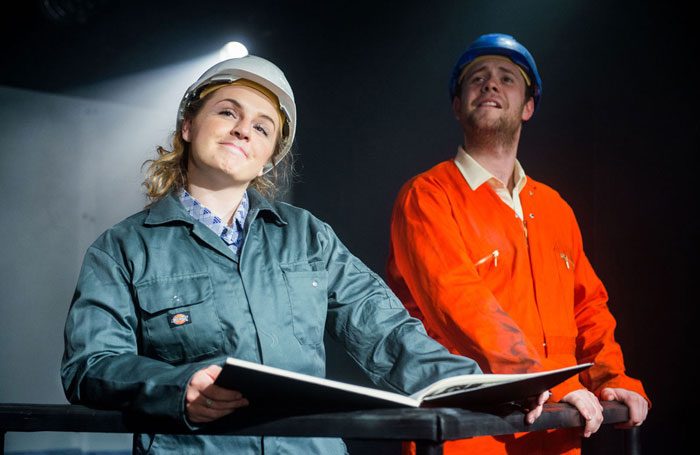It’s thirty years this year since the Piper Alpha offshore oil rig disaster killed 167 people, but post-Grenfell, this production by Glasgow’s Bletherbox feels timely in a horrible new way. We’ve definitely been here before with profits-before-people and corporate negligence…
Piper Alpha is not a story that’s very often told, though, so it’s strange that writer Tom Cooper felt it needed a new angle. The key viewpoint here is that of an artist (Charlaye Blair) who spent a week on board the rig, sketching the workers, shortly before the fire. Her path crosses that of workers Robbie (Brian James O’Sullivan), an ice cream man turned DJ turned crane driver, and Jim (Ross McKinnon), a plumber turned maintenance man.
The show is delivered almost entirely directly to the audience, and it’s heavily descriptive and explanatory, more theatre-in-education than Fringe show. The cast of three are excellent, though, and also offer some lovely harmony singing to music arranged by O’Sullivan himself. The set accomplishes a lot with little; something as simple as corrugated grey sheeting makes a perfect seascape backdrop. A very effective helicopter scene is crafted out of lamps, chairs and sound effects.
The piece makes important, if obvious, points about corporate responsibility and lessons not learnt. O’Sullivan doubles, with an impeccable English accent, as the company man trying to brush the disaster under the carpet.
However, the production’s main issue, other than the tendency to show not tell, is that it runs far too close to putting the artist’s own ethical dilemmas ahead of the lost lives of the men themselves. The actual disaster element of the piece is skipped over very quickly to show the artist umming and ahhing about whether to exhibit the pictures she’s created. The real life artist on which this is based, Sue Jane Taylor, is exhibiting her works at the National Museum of Scotland until November. As an accompaniment to that, Part of the Picture works, but in this setting it feels a curiously offhand approach to privilege the feelings of the artist in this way. World War stories, when we’ve heard the soldier’s side so many times, might merit a new treatment. Piper Alpha, when there’s survivors and families still living with the aftermath, probably doesn’t.
